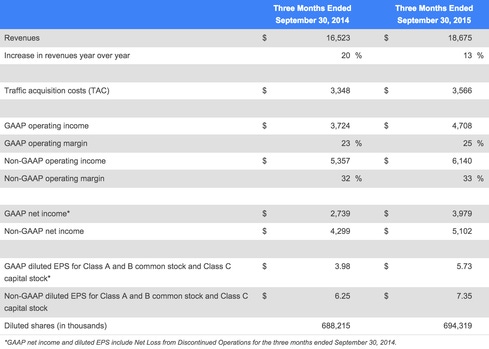Alphabet, Google's Parent, Strikes Earnings Gold With Mobile SearchAlphabet, Google's Parent, Strikes Earnings Gold With Mobile Search
Alphabet, Google's new parent company, exceeded analysts' expectations due in large part to the strength of its mobile search business, according to company executives.


10 Google Milestones: From Stanford Dorm To Alphabet
10 Google Milestones: From Stanford Dorm To Alphabet (Click image for larger view and slideshow.)
Alphabet, Google's new parent company, on Thursday reported that its Google subsidiary earned $18.7 billion in revenue, exceeding analysts' expectations and lifting Alphabet's stock in after-hours trading.
Google's revenue in Q3 2015 grew 13% year-over-year. The company had been expected to report revenue of $18.54 billion, according to Thomson Reuters.
Ruth Porat, CFO of Alphabet and Google, said in a statement that Google's Q3 results underscore the strength of Google's business, particularly in mobile search. She noted that six Google products now have more than one billion users globally. These include: Search, Android, Chrome, Maps, YouTube, and Google Play.
Porat said that for its Q4 report, Alphabet will disclose Google earnings as well as "other bets," companies like Calico and Nest that were previously operated as divisions of Google. She also noted that the strong dollar had a $1.6 billion impact on Google's results, or $1.3 billion when the company's currency hedging program is taken into account.
Both Porat and Google CEO Sundar Pichai celebrated the company's strong mobile search performance.
"Search traffic on mobile phones has now surpassed desktop traffic worldwide," said Pichai.
But questions raised by financial analysts on the company's conference call suggest ongoing doubts about Google's ability to monetize that traffic. Investors hope that Google will be able to match its desktop search revenue by selling ads on mobile devices, but history may not repeat itself.
In a recent blog post, The Guardian's Charles Arthur articulated those concerns, noting that the average number of Google searches per smartphone per day is less than one. He characterizes mobile search as "a real problem for Google."
[ Read Google Files FAA Paperwork Detailing Its Drone Plans.]
To hear Porat or Pichai tell it, mobile search is one of the many opportunities for Google.
Pichai also expressed optimism about cloud computing. "On the cloud side, it's an exceptional opportunity," he said. "Every business in the world is going to run on cloud eventually."
Pichai said Google's enterprise business, Google for Work, now has over a million paying customers. And he emphasized Google's commitment to machine learning, which informs the company's translation capabilities among many other applications.
"Our investments in machine learning and AI are a priority for us," said Pichai.
The company also announced that its board had authorized the company to buy back up to $5,099,019,513.59 in shares starting this year. The very specific dollar amount corresponds to the square root of 26 -- the same number of letters in the alphabet.
About the Author
You May Also Like






